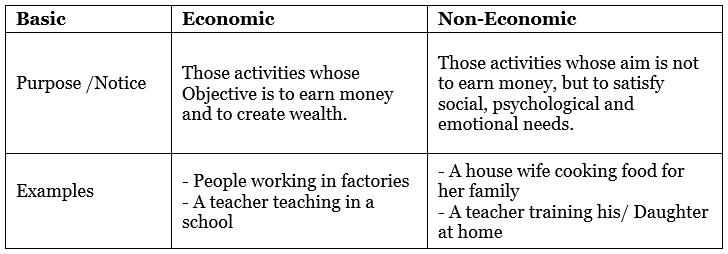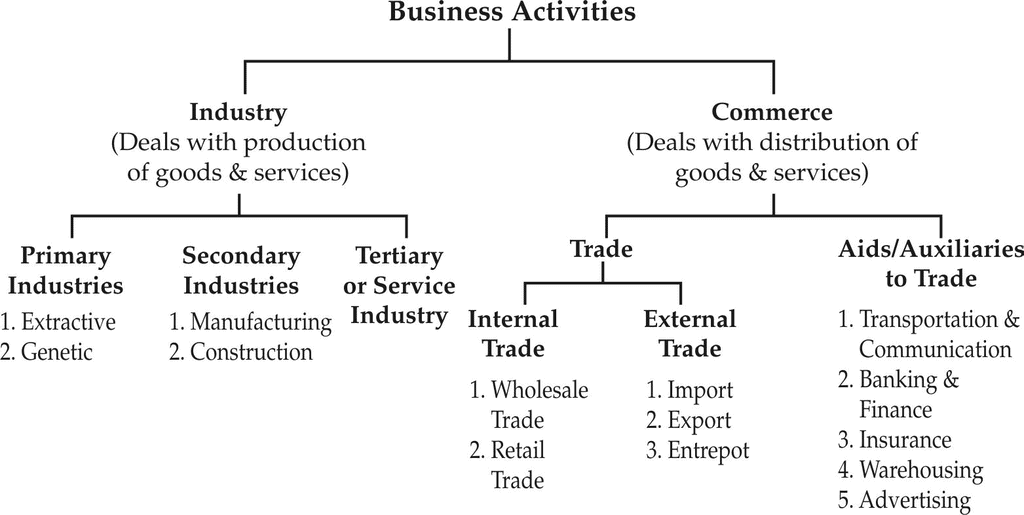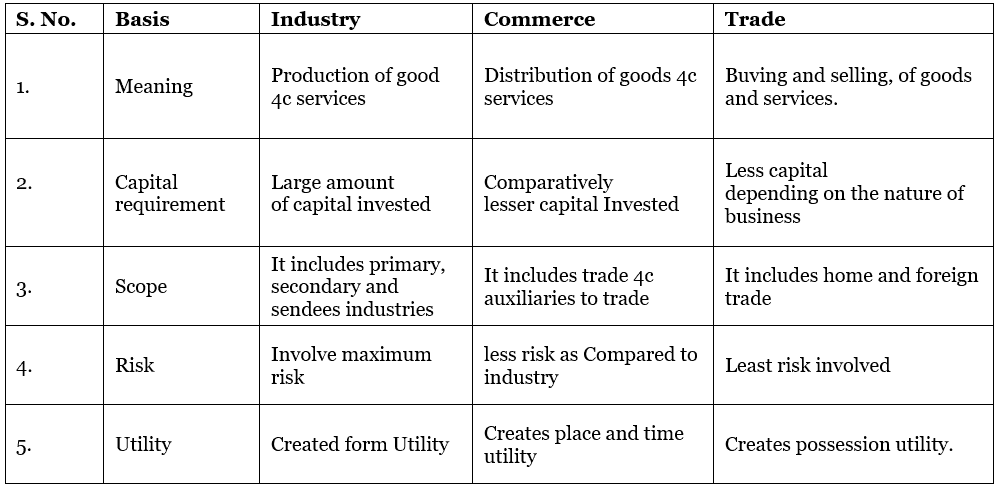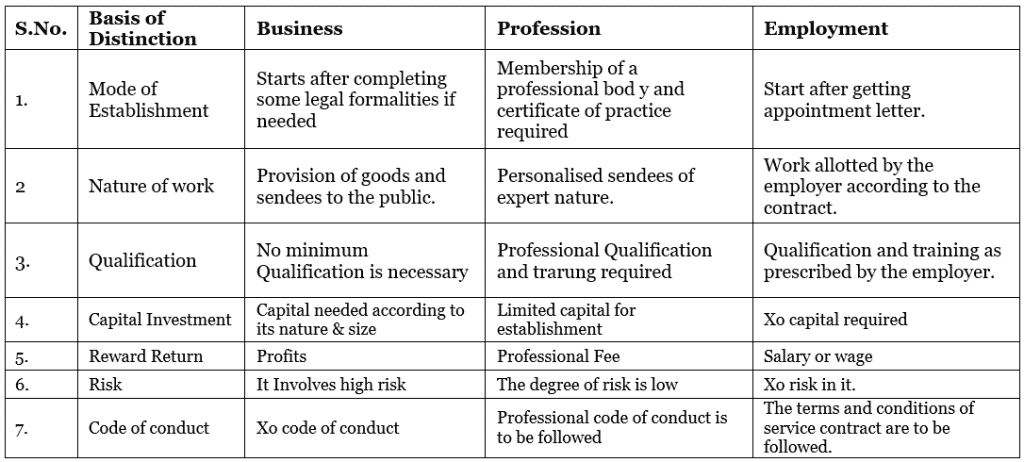Short Notes & Important Questions - Nature and Purpose of Business | Business Studies (BST) Class 11 - Commerce PDF Download
Nature And Purpose of Business- Economic and Non Economic Activities
All Human beings have different types of needs. So, in order to fulfill those needs they have to perform some or the other activity. Human activities are classified into Economic & non economic activities. 
Concept of Business: Business refers to those economic activities involving the purchase, production and/or sale of goods and services with a motive of earning profit by satisfying human needs in society.
Characteristics of Business
1. An economic activity: Business in considered as an economic activity as it is undertaken with the objective of earning money.
2. Production or procurement of goods and services: Business includes all the activities concerned with the production or procurement of goods & services for sales. Services include transportation, banking, Insurance etc.
3. Sale or exchange of goods & services: There should be sale or exchange of goods & service between the seller & the buyer.
4. Dealing in goods & services on a regular basis: There should be regularity of dealings or exchange of goods & services. One single transaction of sale or purchase does not constitute business.
5. Profit Earning: The main purpose of business is to earn profit. A business cannot survive without making profits.
6. Uncertainty of return: Every business invests money with the objective of earning profit. However there is always a possibility of losses.
7. Element of risk: All business activities carry some elements of risk because future is uncertain and business has no control over several factors like, strikes, fire, theft, change in consumer taste etc.
Comparison of Business Profession and Employment


Business: Refers to Purchase, production and/or sale of goods & services with the objective of earning profit.
Profession: Includes those activities which require special knowledge & skills in the occupation.
Employment: Refers to the occupation in which people work for others and get remuneration in return.
Comparison of Business, Profession and Employment

Objectives of Business: The objectives of business means the purpose for which a business is established and carried on. Proper selection of objectives is essential for the success of a business.The businessman always have multiple objectives. All objectives may be classified in two broad categories. These are (1) Economic objectives and (2) Social objectives.
1. Economic Objectives
Business is an economic activity and therefore, its purpose is to show economic results. The economic objectives of business are follows:
(i) Earning Profit: Profit means excess of income over the expenditure. The foremost and prime objective of every businessman is to earn profit. A business cannot survive without earning profit. Not only for survival but it is also require for growth and expansion of business.
(ii) Market standing/creation of customer: Business can survive for a longer period only if it is able to capture a big share in the market and has market standing. It is possible only when business provides goods and services to satisfy the needs and wants of customers. Therefore, creation and satisfaction of customers (market) is an important objective of business.
(iii) Innovation: Innovation means making new products or adding new features to old products for making it more useful, improving methods of production and distribution, exploring new markets, etc. In these days of competition, a business can be successful only when it creates new designs, better machines, improved techniques, new varieties, etc.
(iv) optimum utilization of resources: It refers to the best use of men, material, money and machinery employed in business. The resources of business are scarce so these must be utilized in the best possible manner so that the business can get maximum benefit from these resources.
2. Social Objectives
Business is an integral part of society. It makes use of resources of society. It earns profit by selling its products or services to members of society. So it becomes obligatory on the part of the businessman to do something for the society.
The important social objective of business are as follows:
(i) Quality goods and services at Fair Price: The first social objective of business is to provide better quality product at reasonable price and in proper quantity on continuous basis to consumers.
(ii) Avoidance of Anti-Social and Unfair trade practices: Anti-Social practices include hoarding, black marketing and adulteration. Making false claims in advertisements to mislead and exploit people is an example of unfair trade practice. Business should not indulge in such practices.
(iii) Generation of Employment: Now a days, employment is the biggest problem
of society. Business should provide employment to more and more people living in the country. Handicapped and disabled people should be given extra care.
(iv) Employee Welfare: Employees are a valuable asset and they make
significant contributions towards the success of business. Another social objective of business, therefore, is to ensure welfare of employees by providing good working conditions, fair wages and facilities such as housing, medical and entertainment etc. such welfare facilities help to improve physical and mental health of employees.
(v) Community service: Business should contribute something to the society where it is established and operated library, dispensary, educational institutions etc. are certain contributions which a business can make and help in the development of community.
Role of Profit in Business
Business is established for the purpose of earning profit. Profit plays a very important role in business. The Role of profit in business can be brought out by the following facts:
(1) For Long Survival: Profits alone help a business to continue to exist for a long period. In the absence of profit, the establishment of a particular business loses its justification.
(2) For Growth & Expansion: All businessmen want their business to expand and to grow. For development of business additional capital is needed. Retained earnings is a very good source of capital. The more the profit is in a business, the more reinvestment becomes possible.
(3) For Increasing Efficiency: Profit is that power which motivates both the parties - owner and workers to do their best. As they know that in case of good profits they will get good compensation for their efforts so it finally helps in increasing the efficiency of business.
(4) For Building Prestige and Recognition: For gaining prestige in the society, business has to satisfy all the parties concerned. It has to supply good quality product/service at reasonable price to customers, adequate remuneration to employees, to pay sufficient dividend to the shareholders etc. and all these are possible only if the business is earning good profit.
Classification of Business Activities

1. Primary Industry: The primary industry includes those activities through which the natural resources are used to provide raw material for other industries. Primary industries are of two types.
(i) Extractive- Industry refers to those industries under which something is extracted out of the earth, water or air e.g., coal, iron, gas etc.
(ii) Genetic- Industry refers to those industries under which the breed of animals and vegetables are improved and made more useful e.g., poultry farms, agriculture, dairy farming, tree planting etc.
2. Secondary Industry:- Under this industry new products are manufactured by using the previously produced things e.g., producing cotton is a primary industry and manufacturing cloth out of cotton is a secondary industry. It is of two types.
Manufacturing Industries:- These industries convert raw materials or semi finished products into finished products e.g., paper from bamboo, sugar from sugar cane. It is further be divided into four parts.
(i) Analytic: Different things are manufactured out of one material e.g., petrol, diesel, gasoline out of crude oil.
(ii) Processing: Those industries wherein useful things are manufactured by making the raw material to pass through different production process e.g., steel from iron ore.
(iii) Synthetic: Many raw materials are mixed to produce more useful product e.g., paints, cosmetics.
(iv) Assembling: Where in the parts manufactured by different industries are assembled to produce new and useful product e.g., computers, watches etc.
Construction industries: These industries are involved in the construction of buildings, dams, bridges, roads as well as tunnels and canals. Engineering and architectural skills are an important part in construction industries.
3. Tertiary or Service Industry :- Includes those services which help business to move smoothly e.g. transport, bank, Insurance, storage and Advertising.
Commerce
Meaning: Commerce refers to all those activities which are concerned with the transfer of goods and services from the producers to the consumers. It embraces all those
activities which are necessary for maintaining a free flow of goods and services. The functions of commerce are as follows.
1. Removing the hindrance of person.
2. Transportation removes hindrance of place.
3. Storage and warehousing activities remove the hindrance of time.
4. Insurance removes hindrance of risk.
5. Banking removes hindrance of finance.
6. Advertising removes hindrance of information.
Commerce includes two types of activities
Trade: Refers to buying and selling of goods and services with the objective of earning profit. It is classified into two categories.
1. Internal Trade:- Takes place within a country. Internal trade is classified into two categories wholesale trade and retail trade.
(i) Wholesale Trade: Refers to buying and selling of goods in large quantities. A wholesaler buys goods in large quantities from the producers and sells them to other dealers. He serves as a connecting link between the producer and retailer.
(ii) Retail Trade: Refers to buying of goods and services in relatively small Quantities and selling them to the ultimate consumers.
2. External Trade:- Trade between two or more countries. External trade can be classified into three categories.
(i) Import Trade: If goods are purchased from another country, it is called import trade.
(ii) Export Trade: If goods are sold to other countries it is called export trade.
(iii) Entrepot Trade: Where goods are imported for export to other countries e.g. Indian firm may import some goods from America and export the same to Nepal.
3. Auxiliaries to Trade:- All those activities which help in removing various hindrances which arise in connection with the production and distribution of goods are called auxiliaries to trade. An overview of these activities is given below.
(i) Transportation and Communication: The production of goods takes place at one place where as these are demanded in different parts of the country. The obstacle of place is removed by the transport. Along with transport, communication is also an important service. It helps in exchange of information between producers, consumers and traders. The common communication services are postal service, telephone, fax, internet etc.
(ii) Banking and Finance: Business needs funds for acquiring assets, purchasing raw materials and meeting other expenses. Necessary funds can be obtained from a bank.
(iii) Insurance: It provides a cover against the loss of goods, in the process of transit, storage, theft, fire and other natural calamities.
(iv) Warehousing: There is generally a time lag between the production and consumption of goods. This problem can be solved by storing the goods in warehouses from the time of production till the time they are demanded by customers.
(v) Advertising: Advertising brings goods and services to the knowledge of prospective buyers. It is through advertising that the customers come to know about the new products and their utility.
Business Risk: The term business risk refers to possibility of inadequate profits or even losses due to uncertainties e.g., changes in tastes and preferences of consumers, strike, increased competition, change in Government policy etc. These are of two types speculative & pure.
Nature of Business Risks
1. Business risks arise due to uncertainties: Natural calamities, change in demand and prices, change in technology etc. are some of the examples of uncertainty which create risks.
2. Risk is an essential part of every business: No business can avoid risk. Risk can be minimized but can not be eliminated.
3. Degree of risk depends mainly upon the nature and size of business :- For small scale business, it is less and for large scale business, it is more.
4. Profit is the reward for risk taking: An entrepreneur assumes risks and in consideration he gets reward which is called profit. Greater the risk higher is the chance of profit.
Causes of Business Risk
1. Natural causes: They are beyond human control e.g., flood, earthquake, heavy rains, famine etc.
2. Human causes: It include carelessness or negligence of employees e.g., theft, strikes, riots, misappropriation of cash and goods etc.
3. Economic causes: They are related to a chance of loss due to change in market condition e.g., fluctuations in demand and prices, competition, change in technology etc.
4. Physical causes: Mechanical defects or failures may also lead to losses e.g, bursting of boiler or machine may cause death or destruction.
5. Other causes: These include unforeseen events like political disturbances, fluctuation in exchange rates etc.
Basic Factors for Starting a Business
1. Selecting the line of business: The first thing to be decided by the entrepreneur is the line and type of business to be undertaken.
2. Scale or size of business: After deciding the line of business, the businessman must decide whether he wants to set up large scale or small scale business.
3. Choice of form of Business organisation: The next decision must be taken is to finalize the form of business i.e., to set up sole proprietorship, partnership or joint stock company.
4. Location of Business Enterprise: The entrepreneur has to decide the place where
the enterprise will be located. Before taking this decision he must find out availability of raw materials, power, labour, banking, transportation etc.
5. Financial Requirement: The businessman must analyse the amount of capital he might require to buy fixed assets and for working capital (Day to day expenses). Proper financial planning must be done to determine the amount of funds needed.
6. Physical facilities: Physical facilities include machinery, equipment building etc. This decision depends upon the size, scale and type of business activities he wants to carry on.
7. Plant layout: Showing the physical arrangement of machines and equipment needed to manufacture a product.
8. Competent and committed workforce: The entrepreneur must find out the requirement of skilled and unskilled workers and managerial staff to perform various activities.
9. Tax planning: The entrepreneur must try to analyse the types of taxes because there are a number of tax laws in the country which affect the functioning of business.
10. Setting up of the Enterprise: After analysing the above mentioned points carefully the entrepreneur can start the business which would mean mobilizing various resources and completing legal formalities.
Expected Questions - (One Mark Question)
Q.1. Give an example of activity which is economic in one side and non-economic on other side.
Q.2. Why is business considered an economic activity?
Q.3. If a person sells his domestic computer at a profit, will it be considered a business? Also explain the characteristic of business which is being stressed upon in the above said example.
Q.4. Name the economic activity in which specialized knowledge is required.
Q.5. Why is the insurance known as a tertiary industry?
3/4 marks
Q.6. Write four differences among business, profession and employment.
Q.7. No business is risk free in the light of this statement, explain the concept of business risk and it’s any three causes.
Q.8. Explain any four objectives of business.
Q.9. Define commerce. Why is it of great importance in modern life?
Q.10. Distinguish between primary & secondary industry. Give examples.
5/6 marks
Q.11. Define business. Explain the characteristics of business (any four)
Q.12. Commerce is the sum total of activities that remove hindrances in the free flow of goods from producers to consumers. Explain.
Q.13. Explain any six factors that are important to be considered while starting a business.
Q.14. Write difference among industry, commerce and trade on any five basis.
Q.15. Profit maximization can't be the sole objective of a business. Explain.
|
37 videos|142 docs|38 tests
|
FAQs on Short Notes & Important Questions - Nature and Purpose of Business - Business Studies (BST) Class 11 - Commerce
| 1. What is the nature and purpose of business? |  |
| 2. What are the characteristics of business? |  |
| 3. What is commerce? |  |
| 4. What are the causes of business risks? |  |
| 5. What is the nature of business risks? |  |

|
Explore Courses for Commerce exam
|

|




















